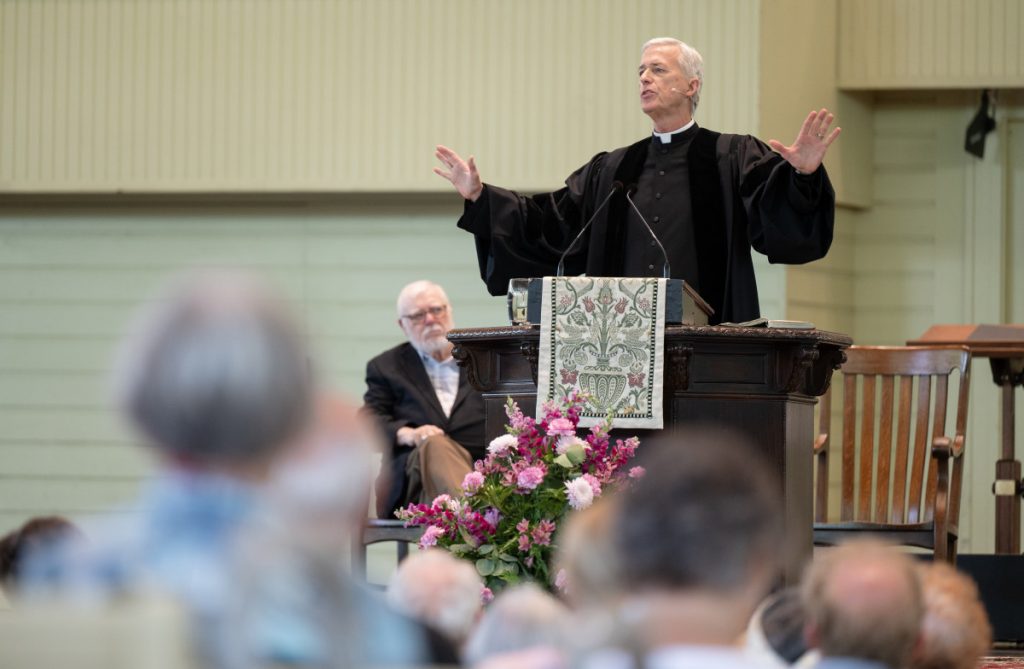
Column by Mary Lee Talbot
“We are living in a time when our polarization is at an all-time high and our trust in our institutions is at an all-time low. What will it take to heal our most significant and binding relationships?” asked the Rev. M. Craig Barnes. “What does scripture have to say about this relationship, about the healing of despair.”
He preached at the 9:15 a.m. Monday morning worship service in the Amphitheater. The title of his sermon was “Healing Our Despair,” and the scripture reading was John 5: 1-9.
In John’s gospel, Jesus and the disciples were going into Jerusalem and stopped at the pool of Beth-zatha. There was a legend about the pool that periodically an angel would touch the water and it would be disturbed. The first person in the pool when it was disturbed would be healed of any infirmity.
Jesus saw a man who was lame, who had been waiting 38 years to be the first in the water.
“That was his plan for healing. He was devoted to the plan even though it was not working and would never work,” Barnes said. “Jesus asked him a profound question, ‘Do you want to be healed?’ ”
“In seminary, we teach students that just because people complain, doesn’t mean they want you to fix it,” he said. “You can save yourself a lot of frustration.”
He continued, “This is my sentence for today: People prefer the misery they know to the mystery they do not. Let me repeat that: People prefer the misery they know to the mystery they do not.”
It does not make sense, it is not logical. “Mystery,” he said to the congregation, “is way better than misery. We are not logical about misery. We befriend it and trust it. We might complain about our lives, our families, our jobs, the country, but we don’t want change.”
Jesus calls people out on the unwillingness to give up misery and asks them if they are sure they do not want to change. As an illustration, Barnes told a story from author C.S. Lewis’ The Great Divorce.
In the novel, Lewis depicts people leaving hell on a bus to go to heaven. As an aside, Barnes said he thought that Lewis, like Dante, believed hell was of our own making. The bus did not go the whole way up the hill; people had to walk the rest of the way to get to heaven and make the choice to leave their misery behind.
In one vignette, a man walking up the hill has a lizard on his shoulder. The lizard is digging its claws into the man’s shoulder and whispering things in his ear. An angel sees the man and asks him, “Do you really want that lizard on your shoulder?” The man responds, “I hate the lizard. He hurts me and says the most disgusting things.” The angel asks, “Shall I kill him?”
The man decides to think about the possibility, and the lizard finally talks and says, “The angel will kill me and you will be alone. Let’s go back.” The man says to the angel, “Yes, please kill him,” and the angel cuts off the lizard’s head. The lizard is transformed into a winged stallion and the man climbs upon it and flies to heaven.
“My point,” said Barnes, “is that it hurts to get better.”
In response to Jesus’ question, “Do you want to be made well?” the man at the pool of Beth-zatha talked about an unjust system but didn’t answer Jesus’ question. “It was like the man was about to suggest that Jesus form a task force to make recommendations to the Bureau of Angelic Visitations to make getting into the pool more equitable,” Barnes said.
Jesus ignored all that and told the man, “Take up your mat and walk. It is time to be healed.” Barnes said, “That is grace. The man did not earn it — Jesus just gave it to him. This is the benevolent love of a healer who breaks into our despair and gives us what we need. The man needed grace to get up and move.”
Barnes said society is in a debate about “what we deserve. The question is about what we actually need.” Students would come into Barnes’ office and talk to him about wanting what they deserved. “Trust me, I told them, the last thing you want is what you deserve. What you need is to give thanks to God by the grace of Jesus Christ who gives you what you need.”
In a world full of need, Barnes asked the congregation, can we get back on our feet and move in the right direction? “In choosing hope, it takes courage and faith to accept the grace of the healer. He is closer than you think and not nearly done,” he concluded.
The Rt. Rev. Eugene Taylor Sutton, senior pastor of Chautauqua Institution, presided. The Rev. Mary Lee Talbot, a writer for The Chautauquan Daily, read the scripture. Nicholas Stigall, organ scholar, played “Prelude,” on Land of Rest by Raymond Haan for the prelude. The Motet Choir sang “Lord, Make Me an Instrument of Thy Peace,” by John Rutter. The choir was directed by Joshua Stafford, director of sacred music and Jared Jacobsen Chair for the Organist, and accompanied by Stigall on the Massey Memorial Organ. The postlude, played by Stafford, was “Allegro,” from Concerto in D Minor, BWV 596, by Johann Sebastian Bach after Vivaldi. Support for this week’s chaplaincy and preaching is provided by the Mr. and Mrs. William Uhler Follansbee Memorial Chaplaincy.




